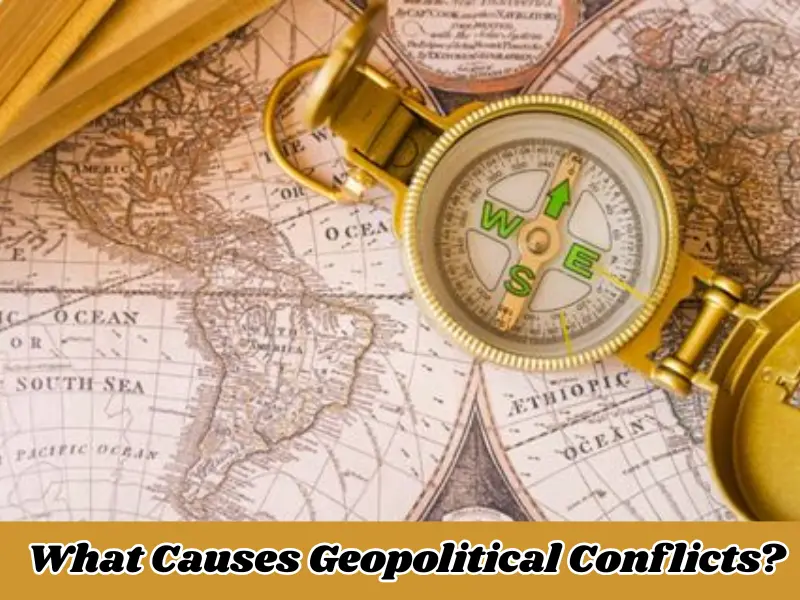Introduction
The world we live in is connected in many ways, but it’s also full of tensions between countries. These tensions, known as geopolitical conflicts, are disagreements between nations over land, power, resources, or beliefs.
Understanding these conflicts is important because they affect not just the countries involved but also people like you and me — through the news we see, the prices we pay, and the safety of our world.
Example: A well-known conflict is between Russia and Ukraine, where Russia invaded Ukraine in 2022, causing global impact. Another ongoing example is the Israel-Palestine conflict, a long struggle over land and rights.
What Causes Geopolitical Conflicts?
Geopolitical conflicts don’t happen without reason. Here are some common causes:

- Land and Border Disputes: Countries often fight over land, like who owns what territory.
- Resources: Oil, gas, water, and minerals are limited. Countries may fight to control these.
- Religious and Cultural Differences: Different beliefs can lead to misunderstandings or hatred.
- Political Power and Influence: Nations want to be powerful and lead global decisions.
- Historical Issues: Old wars, broken promises, or past invasions can still cause trouble today.
Real-World Examples
Let’s look at a few conflicts happening around the world:
- Russia and Ukraine: A war that started in 2022 over territory, politics, and power.
- Israel and Palestine: A long-standing conflict over land, religion, and national identity.
- China and Taiwan: China sees Taiwan as its own, but Taiwan wants to be independent.
- India and Pakistan: These neighbors have fought wars over Kashmir and still face tensions.
How Do These Conflicts Affect the World?
You might wonder — how do these conflicts impact me? The truth is, they have global effects:
- Oil and Gas Prices Go Up: Wars can block supply routes, making fuel more expensive.
- Refugee Crises: Millions of people are forced to leave their homes.
- Economic Slowdowns: Businesses and economies suffer due to instability.
- Political Tension: Countries take sides, which creates more divisions.
- Impact on Daily Life: Prices rise, safety concerns increase, and social media is full of debates.
Role of Global Powers and Organizations
Big countries and international groups try to manage these conflicts:
- UN (United Nations): Tries to bring peace through talks and peacekeeping missions.
- NATO: A military group that supports its members and may defend them during attacks.
- USA and Other Superpowers: They often help with weapons, money, or diplomacy.
- Sanctions and Peace Talks: Economic penalties or negotiations to reduce fighting.
Can These Conflicts Be Resolved?
It’s hard, but not impossible:

- Diplomacy and Peace Talks: Countries sometimes talk it out and sign peace deals.
- Public Protests and Opinion: People around the world can pressure leaders to stop war.
- Challenges: Trust issues, power struggles, and deep-rooted hatred often slow progress.
Why Should You Care?
Even if the conflict is far away, it still matters:
- Your Economy Is Affected: Food, fuel, and product prices can rise.
- It Impacts Your Safety: War increases global risk and insecurity.
- Social Media and News: You’ll understand world events better and avoid fake news.
- Support Peace: Being informed helps you stand for peace and unity.
FAQs – Geopolitical Conflicts
What does “geopolitical conflict” mean?
A geopolitical conflict is a disagreement or fight between countries over things like land, resources, power, or beliefs. It often involves politics and geography.
How is a conflict different from a war?
A conflict can be any tension or dispute between countries — it doesn’t always mean fighting. A war is a type of conflict that involves actual combat and violence.
Why do some conflicts last for decades?
Many conflicts are tied to history, culture, religion, or deep mistrust. These complex issues take a long time to solve, especially when both sides refuse to compromise.
Can regular people help stop geopolitical conflicts?
Yes, in small ways. Raising awareness, supporting peace efforts, and staying informed can make a difference. Public pressure can also push leaders toward peaceful solutions.
How do these conflicts affect my daily life?
They can lead to higher fuel and food prices, create global insecurity, and affect what you see in the news and social media. Global peace benefits everyone.
What is the role of the United Nations in conflicts?
The United Nations (UN) works to bring peace through dialogue, peacekeeping missions, and humanitarian aid. It encourages countries to resolve issues without violence.
Conclusion
Geopolitical conflicts may seem complicated, but understanding the basics helps us see how the world works. These conflicts are about more than just politics — they touch lives, shake economies, and challenge peace.
Let’s stay informed and hopeful. With awareness and global cooperation, peace can always be a possibility.



